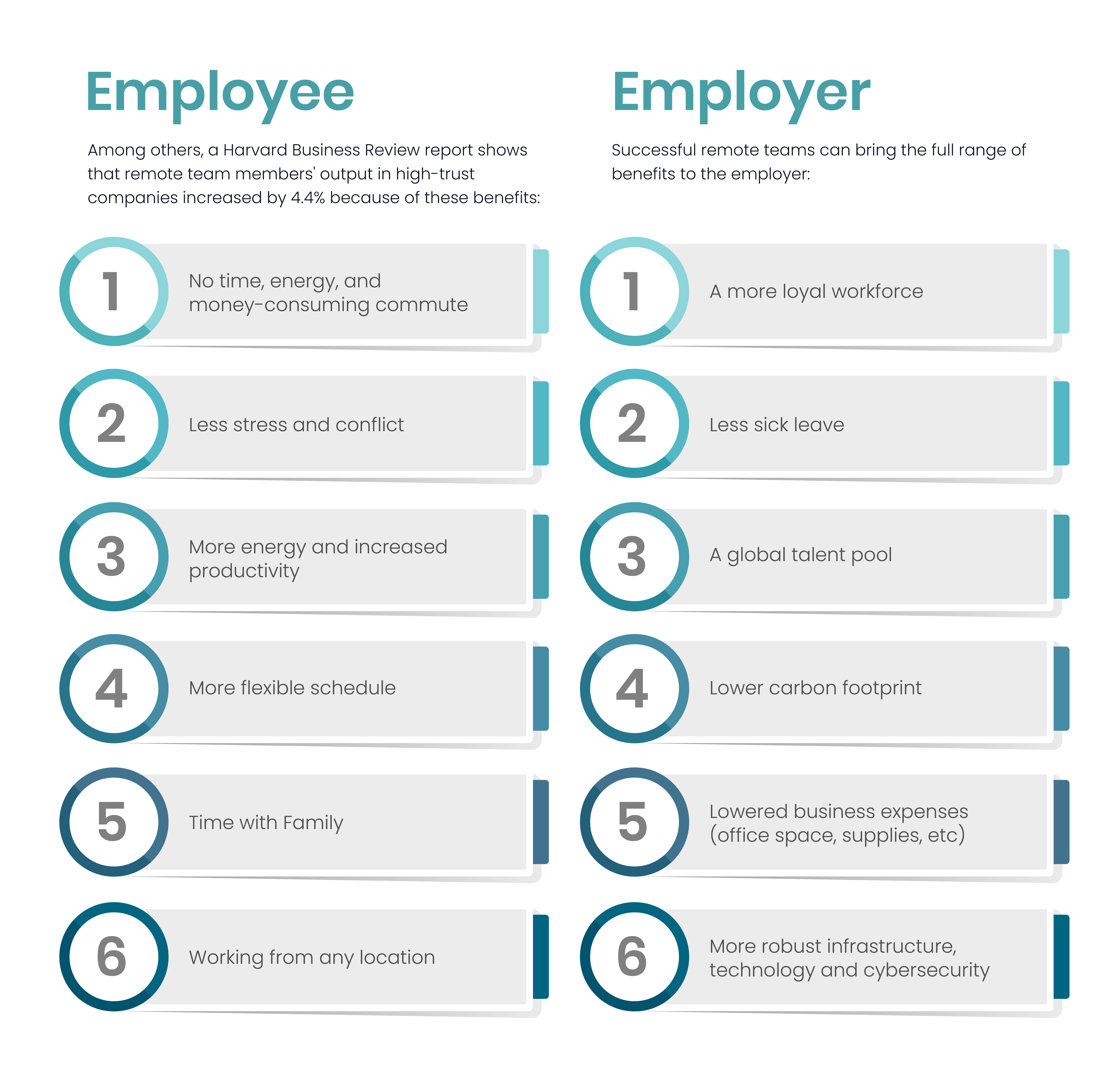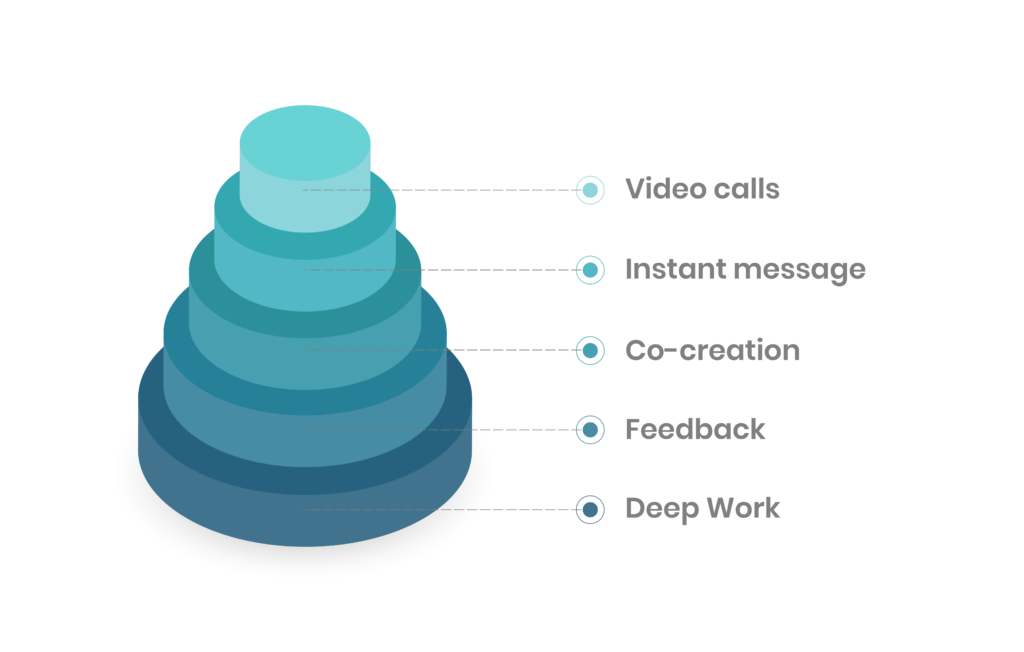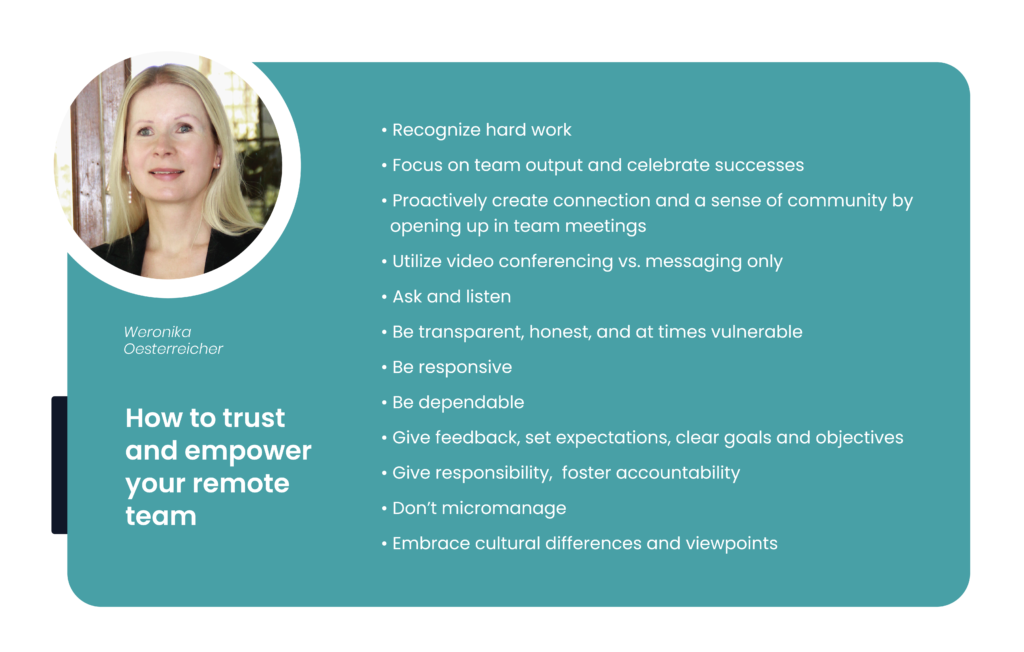Undeniable Advantages, Key Strategies and Measurable Benefits

How do you build trust and empower your remote team? This article dives into the fundamentals and helps to identify key areas that support trust in virtual teams.
“Trust, in many ways, is the new currency of business.”
An evolving startup needs an evolving leader: the startup CEO
Contents
The Advantages of Virtual Teams
Understanding the advantages of virtual teams helps to lay the foundation for a positive approach to remote work and a starting point to build trust with and in remote teams.
Some of the biggest advantages of a virtual workplace for the employee are saving a lot of time and money on not having to commute, a more flexible schedule, and being able to work from the city or even country of their choice.
For employers, this means that offering flexible or full remote work arrangements are an important contributor to overall employee satisfaction. In addition, building virtual teams allows companies to build more teams with more diverse backgrounds, skills and abilities than might be available in the local job market of any given location.
Even after assessing the advantages of virtual team set ups for both employee and employer, it is important to understand how to build and empower a virtual team.
From market and industry specifics to communication strategy and technology and tools that support efficient and effective remote work. Every organization needs a custom plan to effectively implement new or empower existing virtual teams.
6 Employee Benefits of Building Trust in Virtual Teams

“48,4% of employers consider remote work an important factor in future employment decisions.”
How to Build Trust in Teams that Work Remotely
Typically, trust develops early in team formation, when communication channels are established, expectations are being set and roles defined. Setting up face-to-face video orientations to introduce the company’s communication network and build trust through the flow of information and personalized virtual communication, this allows all team members to experience, explore and ask questions about the remote team work practices.
There are different parts to remote team setups that together impact the successful outcome of remote team work:
✔️ Communication channels
✔️ Tools that shape virtual workplace set up
✔️ A clear purpose with a focus on outcomes

Communication Channels for Virtual Teams
For fully remote teams to reach their full potential, effective communication is a key pillar of building trust in remote co-workers and managers alike. Communication channels allow a quick overview of and access to each team member, with direct communication in chats or calls never more than a click away.
Team trust in remote teams is a combination of:
✔️ Reliably delivering on commitments and interdependencies
✔️ Open communication to eliminate questions, roadblocks and delays
✔️ Confidence in each team member’s commitment to the project
As communication technology improves, many communication-focused tools offer virtual teams a full range of effective ways to interact, often creating a close second to in-person meetings. Select a combination of communication tools that suit your organization’s and your team’s needs:
▶️video-based messaging
▶️voice messaging
▶️text-based messaging
Finding the right mix for a virtual team is important to ensure team members are comfortable communicating. A smooth flow of communication in the appropriate way will lead to effective communication and team success.
Communication tools that support remote teams in sharing information, progress or updates in real time through video or voice calls are critical to the success of the virtual team. These tools help to build trust from day one of a remote team setting, allowing team members to convey important, time-sensitive information through the agreed channels with the intended intonation and intention, rather than leaving it up for individual team members’ interpretation in text-based communication tools.
Delivering on Commitments in Virtual Teams
For managers as well as team members, task management tools take the guesswork out of who is doing what, by when, and with whom. Helping a team track goals, meet deadlines, assign tasks to other team members and add comments or a brand new project can all be done in one single management tool.
A search for the tool your organization and your team could benefit from the most can be done using the following categories to help you narrow down your search:
▶️Project management
▶️Task management
▶️Process documentation
▶️Desktop virtualization
▶️File sharing
▶️Scheduling
▶️Co-creation
Want to know more?
Take a closer look at the topic of Virtual Workplaces in the article from Key Search’s Head of Innovation, Darek Mlodnicki.
A Checklist for Virtual Teams
The checklist of tips below is my suggestion to work towards and keep in mind with your remote team.

A Focus on outcomes for Virtual Teams
Deepening the culture of trust from the communication tools into projects, work streams and daily tasks means prioritizing the outcome, not micromanaging the steps it took to get there. This is especially true when interdependencies and deadlines are met.
When a remote team has the autonomy to complete their work their way, as long as the agreed-upon communication, work, and coordination tools are used to complete and share it, the team productivity and satisfaction increases.
Key Search Celebrates the Benefits of Being a Fully Remote Team
Many reasons play into a company’s decision for a full remote set-up. At Key Search, we see the many benefits of a virtual team, virtual office, and its digital workplace in our work efficiency, work-life-balance, job mobility and flexibility. Many of our clients have also moved to a hybrid or full remote set-up.
When researched well and used with the intention to optimize remote work for employees and employers, technology can facilitate trust-building, effective communication, and the coordination of efficient workstreams.
